What's the difference between "Normal Reload", "Hard Reload", and "Empty Cache and Hard Reload" in Chrome?
Normal reload
The same thing as pressing F5. This will use the cache but revalidate everything during page load, looking for "304 Not Modified" responses. If the browser can avoid re-downloading cached JavaScript files, images, text files, etc. then it will.
Hard reload
Don't use anything in the cache when making the request. (which is equal to SHIFT+F5 No need to open Developer console) Force the browser do re-download every JavaScript file, image, text file, etc.
Empty Cache and Hard Reload
Obviously, if the cache is empty then it will have to do a hard reload. This will again force the browser to re-download everything. However, if the page makes any after-the-fact downloads via JavaScript that weren't part of page load, then these might still use the cache, which is where emptying the cache helps because it makes sure that even these won't use cached files.
Note: This feature is only available when the developer tools are open.
This also works in Mac OS X. Open developer tools, and then, on the reload button, either1. secondary click (right click for right-handed mouse), or2. long click, aka long pressto see the menu.
In addition to this answer, hard reload often causes proxies, content delivery networks and other remote caches to be refreshed.
The following method let you clear cache only for the troubled URL. It helped me when I was stuck with http to https redirection cache.
- Open Chrome developer tools, in Windows I use
F12 - Check
Preserve logto save the log before redirection - Right click the redirected URL and
Clear browser cache
This will clear only the troubled cache without affecting normal cache.
